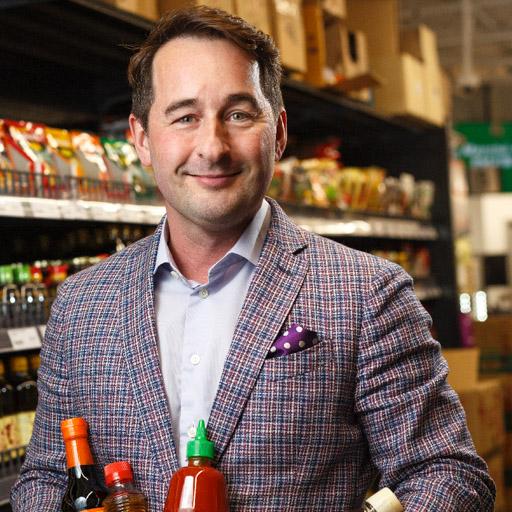
Lisa Graves
Dr. Jordan LeBel, PhD, ASC, CDir.
- Professor, Marketing
Are you the profile owner?
Sign in to editResearch areas: Sensory Design; Governance and Public Health, Food and Foodservice Marketing, Consumer Education, Communication Strategies, Food and Foodservice Innovation
Contact information
Email:
Biography
Education
Certificate in Corporate Governance (Laval University, 2017)
Ph.D. (McGill University, 2001)
M.Sc. (Cornell University, 1992)
B.Sc. (Cornell University, 1990)
Associates Degree (ITHQ, 1988)
Areas of expertise
- Eating behaviour
- Food and wine marketing
- Hedonic and aesthetic consumption
- Impact of pleasure on consumption decisions and behaviours
- Internet branding strategies
Teaching activities
MARK 458: The Marketing of Food
The food and beverage industry — encompassing various entities including commodity brokers, importers,distributors, packaged goods manufacturers, transformers, retailers, and restaurants — is an important source of employment opportunities and avital component of our economy. This course will introduce students to the structure of the industry, the operating realities of its key players, and the marketing challenges facing them. The course will also expose students to potential solutions as well as new theories and concepts that will broaden their marketing knowledge and provide them with the tools to develop solutions to food marketing challenges.
The course is designed to achieve two critical and overarching objectives: 1) introduce students to the significance — economic,social, and otherwise — of the food industry, and 2) to develop an appreciation for the complexity of marketing issues and challenges facing the industry while building awareness for the need for responsible stewardship within it.
MBA 644: Marketing Management
Thiscourse is an introduction to theprinciples and key concepts of marketing management. As such, students areexpected to learn the terminology associated with the field of marketing, itskey concepts, and how to apply them. The course is designed to achieve twooverarching objectives: 1) to develop a “marketing mindset” withinparticipants, meaning an ability to uncover and take advantage of marketingopportunities otherwise overlooked or unexplored; and 2) to foster the values,attitudes and behaviors associated with leadership in the field of marketing.These objectives and the design of the course are rooted in two fundamental premises.First, the economic and competitive landscapes have caused a shift inconsumers’ spending and in business practices, forcing a renewed emphasis formarketers to do more with less and to become accountable. Secondly, pressingsocietal problems of unprecedented magnitude around the world are calling forbusinesses, government and non-government organizations, and other civilsociety members to collaborate in the development of effective and sustainablesolutions.
MBA644 is designed to prepare participants for leadership at the intersection ofbusiness and society. Given the complexity of the problems and environmentalissues faced by today’s businesses, societies, and governments, “silo” thinkingand “business as usual” are no longer acceptable modus operandi. Today’ssuccessful organizations and tomorrow’s leading MBA graduates cannot afford tolook at marketing as an isolated function but must rather develop a mindsetwhereby marketing permeates their every actions and how they look at their environment.If business practices have sometimes been a cause of current problems,businesses and marketers can also be part of the solution. Our common futuredepends on the extent to which managers and executives develop a vision of abetter world and on their ability to draw on the resources of companies andorganizations to help implement that vision. This course will explore howmarketing managers can simultaneously contribute to the success of theirorganization as well as to society’s well-being.
Research activities
Explorations in Sensory Design
This research program is situated at the intersection of design, marketing, anthropology (including design anthropology and sensory ethnography) and psychology (including consumer psychology and sensory evaluation.
This research program asks: How can we best analyze, and gain a critical purchase on, the flowering of the senses in contemporary design? This project is funded by the Social Sciences and Humanities Research Council of Canada.
Corporate Governance and Public Health
Public Health is often seen as the responsibility and exclusive purview of government but pandemics and other crises often confronts the profit-oriented perspective of corporate governance against the population health and wellbeing focus of public health officials. The current pandemic offers a teachable moment to sensitize and outfit board administrators and business executives with tools and understanding needed to leverage the opportunities of crafting a post-pandemic where issues of public health and addressed and accounted for in corporate governance matters.
Publications
Refereed Journal Article
Elliott, C.,E. Truman, J. LeBel (2024). Foodmarketing to young adults: Platforms and persuasive power in Canada. YoungConsumers, Vol. 25, No. 5, pp 592-606. https://doi.org/10.1108/YC-11-2023-1902
Yang, J., L.Katsanis, J. LeBel (2022). Does Online Convenience Make You Want To Buy More?Social Presence and Purchase Intention in Social Commerce. InternationalJournal of Management, Marketing and Decision Science, vol. 2 no. 1, 66-84.
LeBel, J., M. LeBouthillier (2019). Tacos, Sriracha et sauce soya : le marketing qui nous fait aimer ces aliments venus d’ailleurs. In Cuizine, vol. 10, no. 1, P. Emeline & G. Sicotte (Eds) https://www.erudit.org/fr/revues/cuizine/2019-v10-n1-cuizine04600/1059906ar/
Book Chapters
LeBel, J. L. & A. Détolle (2017). « Le marketing du cidre de glace du Québec : quand un repositionnement s’impose pour éviter l’impasse » dans La transformation du cidre au Québec, L. M. Cloutier & A. Détolle (Éds), pages 247-271, Montréal : Presses de l’Université du Québec.
LeBel, J.L. (2016). Food Retailing in Canada : Shaping Choice and What Canadians Eat. In C. Elliott (Ed.) How Canadians Communicate VI: Food Promotion, Consumption, and Controversy, pp. 35-52, Edmonton, AB : AU Press.

